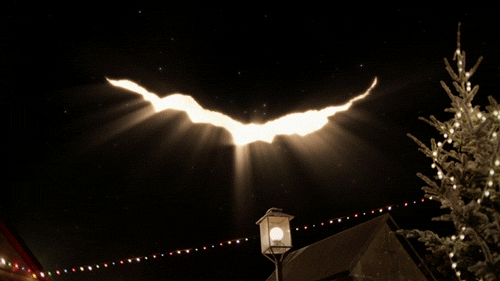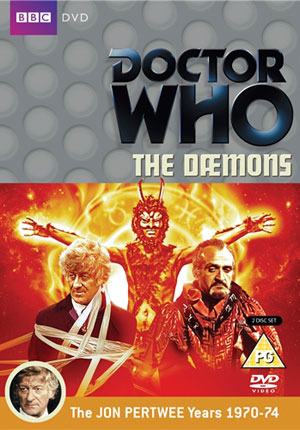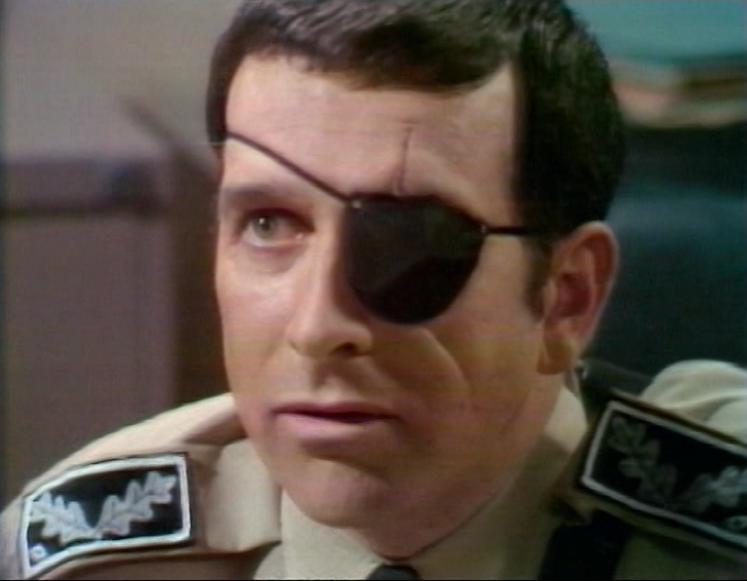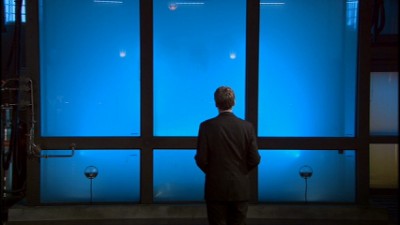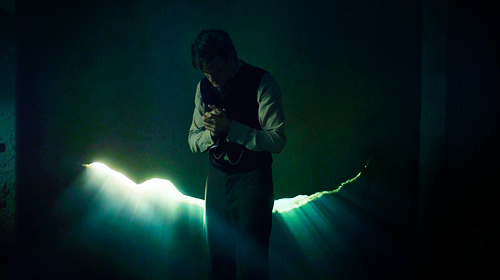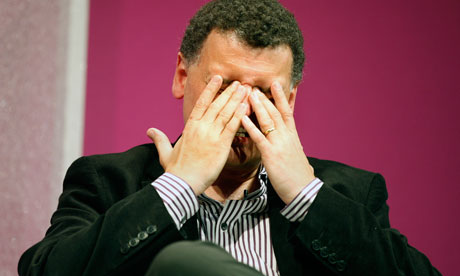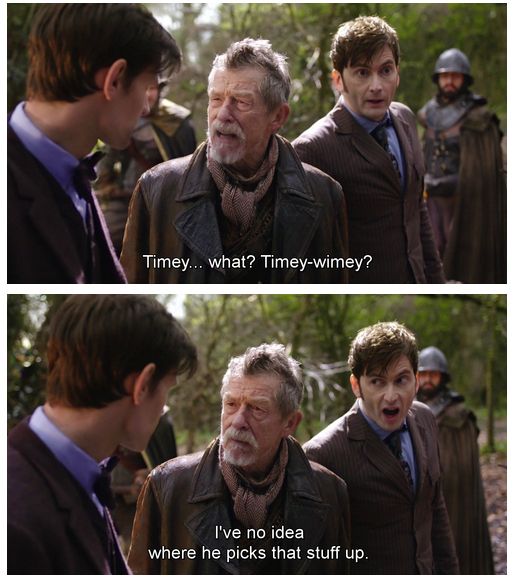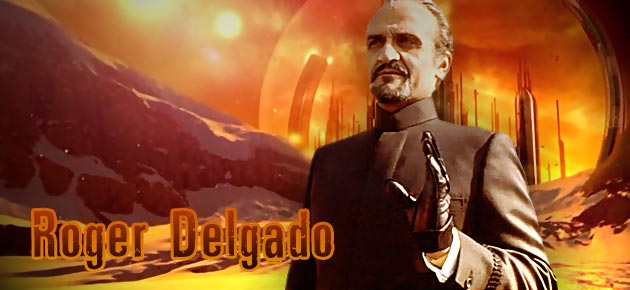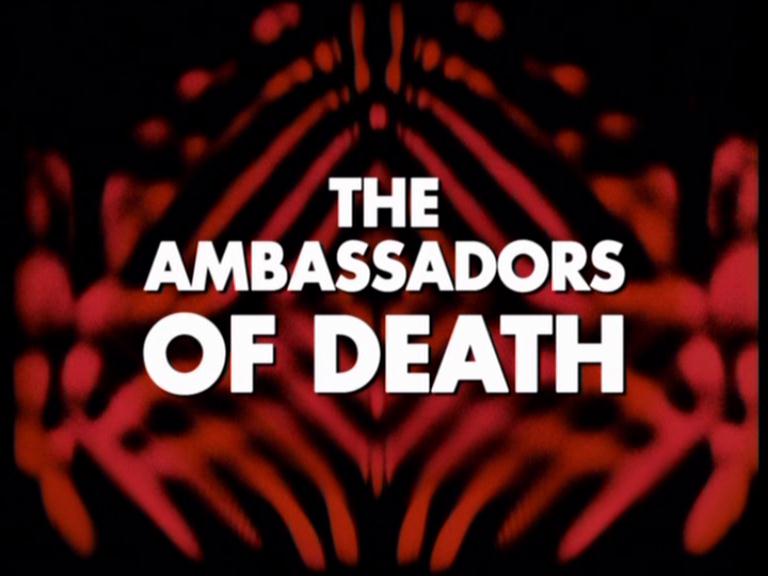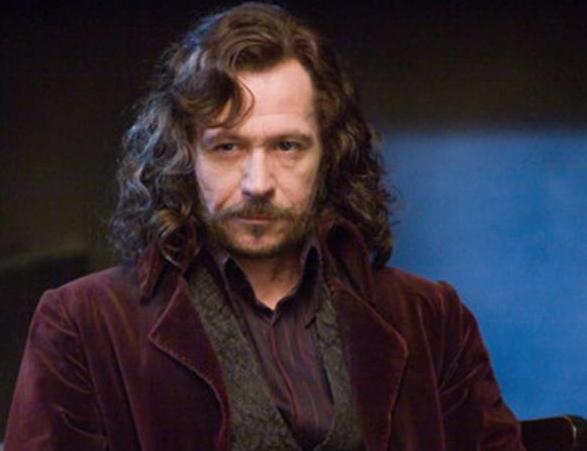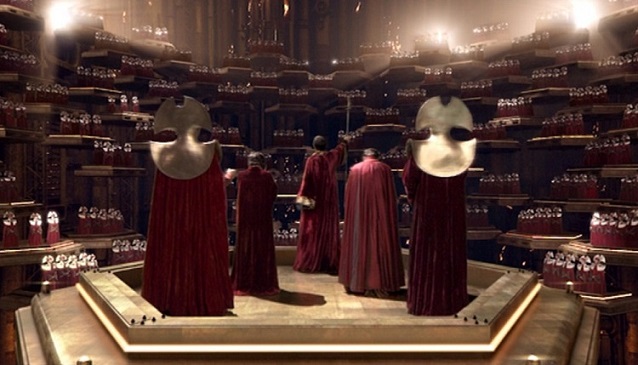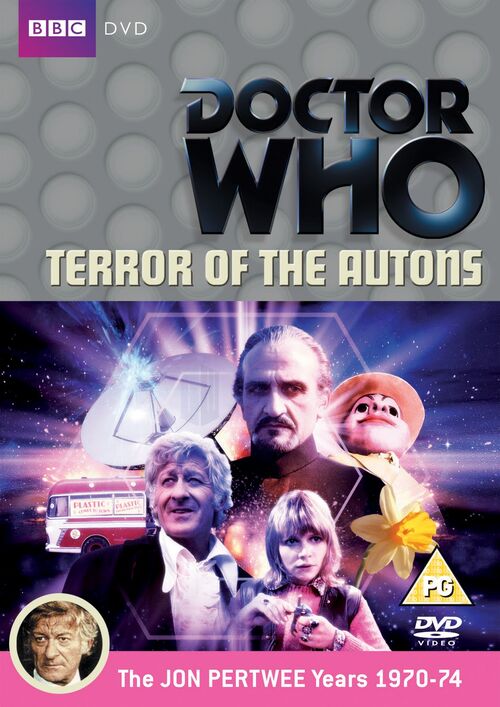
Terror of the Autons. As far as introductions for an excellent enemy go, this has to be one of the poorest. It's up there with The Daleks as the worst intro for a returning villain ever. I'm not kidding. This story is boring.
So this'll be a "short" post. I'd much rather write about more interesting episodes.
The Arrival of the Master
The arrival of the Master is heralded by one of the few interesting things in the episode: a Time Lord appearing out of nowhere, in mid-air, to warn the Doctor. And then a bomb that is placed in the most supervillain-esque way possible rigged up to a door.
Side Note: A few things about the Master
 The Master is a renegade Time Lord, like the Doctor. He has a more advanced degree from the Time Lord Academy than the Doctor (and yet a Doctorate is higher than a Masters degree. He he.) He has a tissue compression device, which never appears again that shrinks people into dolls. Yes, that's right. I mean, talk about a creative weapon. He has a beard of evil, dresses in black, plants obvious bombs, kills people with demon dolls, and his TARDIS has a working chameleon circuit and is a better model than Sexy.
The Master is a renegade Time Lord, like the Doctor. He has a more advanced degree from the Time Lord Academy than the Doctor (and yet a Doctorate is higher than a Masters degree. He he.) He has a tissue compression device, which never appears again that shrinks people into dolls. Yes, that's right. I mean, talk about a creative weapon. He has a beard of evil, dresses in black, plants obvious bombs, kills people with demon dolls, and his TARDIS has a working chameleon circuit and is a better model than Sexy.
Roger Delgado's Master, ladies and gentlemen.
Now, we won't question how Time Lords can float in mid-air or time travel without TARDISes (because that's honestly not an issue for an insanely powerful species like the Time Lords) but we should be questioning why the Time Lords don't do something about the Master's presence on earth.
Useless Time Lords
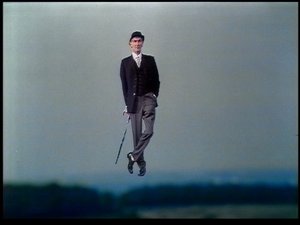 The Time Lords serve as the origin story for the Doctor. Even the Time Lord who appears in Terror of the Autons only appears to deliver so backstory about the Doctor and the Master, and to explain that the Doctor didn't do so well in school. (Where did I hear the figure 51% on his second try?).
The Time Lords serve as the origin story for the Doctor. Even the Time Lord who appears in Terror of the Autons only appears to deliver so backstory about the Doctor and the Master, and to explain that the Doctor didn't do so well in school. (Where did I hear the figure 51% on his second try?).
The problem, though, with a species that exists to be an awesome origin story is that if the species is going to continue to exist, they have to continue to be awesome. Otherwise you get plot-holes galore.
The non-intervention of the Time Lords is a problem in two stories this season: this one and Colony in Space.
In this story, a Time Lord shows up to warn the Doctor about the Master, and then leaves without doing anything about it. Now, clearly this isn't the fault of the Time Lords no caring enough about the Doctor to help him (they came to warn him). Nor is it the fault of the Time Lords' non-intervention policy (the Master is a Time Lord, therefore they're not intervening in anything). So why do they sit there and do nothing?
Remember The War Games? At the end of that one, the Time Lords freeze time, send everyone back to their own time periods, and capture the Doctor. Easily. Like, they don't even have to work at it. So why can't the Time Lords just time-scoop the Master out of wherever he is and put him in some cell in the citadel? Or dematerialize him, like they did to the War Lord.
There's no reason. The Time Lords are just sitting there and doing nothing for no reason. Because they can. Because they're too lazy. Because, well, who the hell knows? They're all too busying trying to get more regenerations or break into Rassilon's tomb, maybe.
The Moment
There's no getting around this one. The Time Lords are a plot hole. They simply are. Their existence means that the Doctor should never have to fight the Master, and we know that that's not true.
So what do we do about this?
 Nothing. RTD did it for us. Burn Gallifrey and turn them into a memory, like a proper origin story should be. An extinct race can be infinitely more powerful than a living one.
Nothing. RTD did it for us. Burn Gallifrey and turn them into a memory, like a proper origin story should be. An extinct race can be infinitely more powerful than a living one.
Now, obviously killing off an entire species is not a way to solve your problems in-show. But from a meta point of view, this is actually the best option. It's horrible that the Doctor killed 2.47 billion children and his entire species when he used the Moment, but it's wonderful that Russel T. Davies killed off the Time Lords.
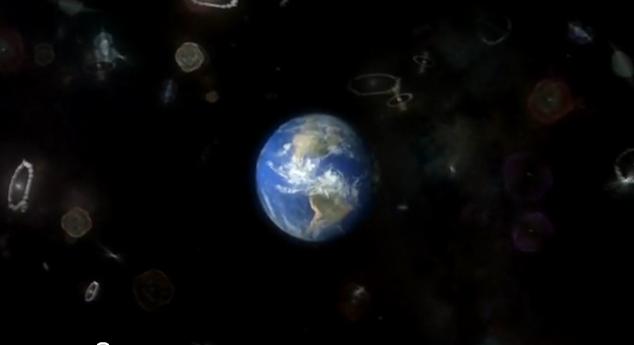 |
| Total event collapse! Every star will supernova. Every moment in history will never have happened! |
Think of how many stories in NuWho wouldn't have worked had the Time Lords been alive, because they would have stepped in. The Stolen Earth/Journey's End (universal destruction), The Pandorica Opens/The Big Bang (total event collapse), The Wedding of River Song (death of time), The Name of the Doctor (destruction of the universe, massive temporal retcon). And that isn't counting the ones that use the non-existence of the Time Lords for emotional drama or as a cheap excuse to make travel between parallel worlds impossible.
A universe with Time Lords is a safe universe. A safe universe doesn't need the Doctor.
Gallifrey Falls No More
Moving forward, what does this mean? If the existence of the Time Lords is a plot hole, what now?
Gallifrey has un-fallen (or never fell at all, depending on what you believe). The Time Lords are calling through cracks in the universe from another. What happens when they come back?
There is only one option for dealing with the existence of Time Lords. And that's to move away from timey-wimey plots and Time Lord villains.
Timey-wimey plots (at least those I'm refering to here) rely on the fact that time itself is in danger or being altered in some way that it shouldn't be. The War Games, City of Death, Father's Day, The Last of the Time Lords, Time Crash, The Big Bang, The Wedding of River Song, The Name of the Doctor, The Time of the Doctor. Only the first and last involve the intervention of the Time Lords, and in both cases the intervention immediately solves the main problem of the plot (how to stop the war games and how the Doctor will save Christmas and survive respectively). All the other ones never would have happened if there were Time Lords.
Time Lord villains rely on the fact that the Time Lords don't keep control of their own. Terror of the Autons (and all Delgado Master stories), The Three Doctors, The Brain of Morbius, The Deadly Assassin, Invasion of Time, Keeper of Traken (and all Ainley Master stories), Arc of Infinity, The Twin Dilemma, Mark of the Rani, Trial of a Time Lord, Time and the Rani, Doctor Who (Roberts Master), Utopia, The Sound of Drums, The Last of the Time Lords, The End of Time, The Day of the Doctor, The Time of the Doctor. Plenty of these have explanations (Three Doctors was a genuine case of "we can't handle this" as was Deadly Assassin, Invasion of Time, Trial, Day and Time of the Doctor. End of Time had the Time Lords as the villains). But most Master and Rani stories are simply down to the Plot Hole of the Time Lords.
You can bring the Time Lords back, but it's at a cost of certain types of stories. Or the logic of the plot.
Shall we hope that they remain firmly in their pocket universe for quite some time?
